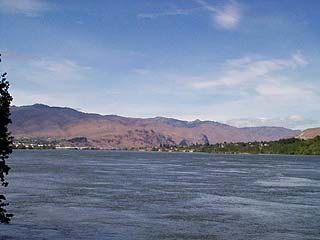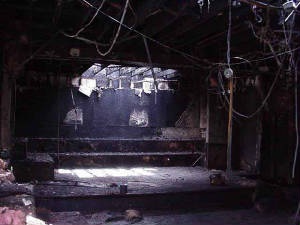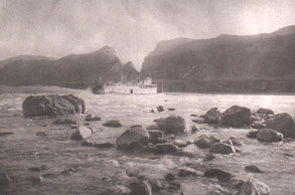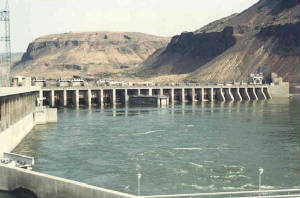
|
| Looking across The Columbia River - 1990's |
I
grew up less than half-a-mile from the swift surging stream of the Mighty Magnificent Columbia River. I had made Mighty and
Magnificent a part of the Columbia’s
name long before I knew what the words really meant; to my child’s mind these wondrous words just seemed to fit the
river that captivated me. From the elevation of our home, we could see miles of the lustrous blue river; it was a constant
alluring presence in my life. At that time, I considered the Columbia to be ‘my’
river; to be honest, I still do.
In
the spring of 1948, the Columbia River flooded over almost its entire length. For twenty days of that
year, as the school bus passed by above some of my classmate’s homes along the river bank, I could look down and see
that those homes had become a part of the river almost to their rooftops. I loved the river but I also respected its awesome
power.
Porter’s
Pond was a landlocked abandoned sand pit that abutted the Columbia River directly west of our home.
Each year, during the spring runoff, as the river rose, the pond became an inlet of the river. When the water receded, my
father used to take us down to fish in the placid pond or sometimes he took us over the sand dune that separated the pond
from the river to fish in the swift river. As children, we were warned to stay away from and out of the river because it had
whirlpools that would “Suck you under and maybe disgorge your drowned and water soaked body miles downstream, if ever.”
It was a horrendous image! But in summer, the pond was a transparent blue jewel and although my brothers and I could not swim,
one blistering hot summer day, when I was ten, we ventured to the enticing pond and discovered that we could touch the bottom
everywhere in a small neck of the pond that was about thirty feet across. As the shadow of the western sand dune began to
encroach on the water, we reluctantly took our happy, tired sun and water drenched bodies the long half-mile home. Since we
were forbidden to go to the pond alone, and because its refreshing lure was too much for children to absolutely resist, we
made only a few secret forays to that sand dune enclosed paradise each year.
The
river possessed a beguiling power that I could not and did not resist. As the years passed, I became clandestinely well acquainted
with “my” half mile of the Columbia at all seasons of the year. The
dry narrow neck that separated the pond from the river was only about sixty feet long; once I had walked out to the river,
a half mile of its bank to the north and south was my secret kingdom. I loved the lacy fingers of transparent ice that festooned
the edges of the wintertime gray-blue river; the damp cold stung my nose even as it invigorated my senses. Later, springtime
breezes carried masses of pink and white petals and momentarily strew them on the swirling surface of the sparkling blue river.
During one of our sweltering hot summer days, when it felt as though the heat was sucking the breath out of me, there was
nothing in the world that I wanted more than to plunge my overheated body into its refreshing blue depths, but I contented
myself with wading along the verge. Every fall my mesmerized gaze would follow the path of a red or golden leaf that had been
carelessly thrust onto the shimmering surface of the river by a capricious wind; the leaf would dance and swirl in the current
for a moment, and then in a blink of time it was sucked down never to be seen again.
I
snuck down to the river every chance I got. Although my visits were seldom long, they were frequent. I would take a long detour on my way home from the bus stop after school; I would steal away when I was supposed
to be in the orchard gathering asparagus or fruit; I repeatedly stole a moment (more like an hour or two) when I was supposed
to be doing housework. My ‘mysterious’ disappearances earned me scoldings and the reputation of being a “scatter-brained
dreamer,” but my child’s soul knew some necessary solace in these secret solitary visits to “my” river.
In
the summer of 1955, my seventeen year old aunt, Rosemary, convinced my mother to let me get a work permit so I could work
in the fruit packing sheds. I was more than willing; a dollar an hour was a lot of money to a fourteen year old. The packing
sheds were pleasantly cool during our scorching mid-June weather and they had a deliciously spicy aroma, like that of winter
apples packed in straw. Our work days were regulated by a loud whistle: it blew to start our day; it blew to release us for
lunch; it blew to call us back after lunch; it blew to let us go at the end of the day. There were probably only three or
four hundred women working in the packing shed, but to me it seemed as though there were thousands of us standing in long
rows with constantly replenished boxes of cherries in front of us. Our job was to create “fancy pack” boxes of
fruit. A fancy pack meant that the fruit in each box was to be unblemished and of equal size. The cherries were gently placed,
rounded side down, into a purple cherry sized egg-carton-like form in the bottom of the box. As I packed, I daydreamed that
my carefully packed, beautiful rich dark red Washington Bing cherries would be purchased and served by some wealthy, appreciative
New York hostess.
On
our lunch breaks, it was difficult to find a shady place to eat, and the hot sun only felt good for about five minutes after
the coolness of the shed. It seemed that every patch of shade was filled before one of our group could race out and claim
it. During our Thursday lunch break, my second week on the job, Rosemary, Sharon, Peggy, and I went exploring. The packing
sheds were all on dead-end streets close to the Columbia River and alongside the railroad tracks. This
was Rosemary’s second year at the packing sheds. She told us about an old boarded-up building that she had glimpsed
last year. It was about a hundred yards to the northeast, beyond the shed where we worked, and behind some outbuildings. We
walked between two of the outbuildings and waded through thigh high ripening wild rye to reach the building. It was almost
on the riverbank. “KEEP OUT” was an invitation to enter, and access
was easy for young agile girls. We simply walked up the splintering, decaying loading ramp and climbed between the boards
that were loosely nailed over the wide, open loading door.
It
took our eyes a moment to adjust to the dim light of the interior. We were in an old, old warehouse. It somehow felt as though
it should be treated with reverent quiet as though we were trespassing on something otherworldly. Close by we found some long
abandoned, battered wooden boxes and dragged them into a circle for seats so we could eat in reasonable comfort. At first,
that warehouse seemed like the answer to a young girl’s prayer. It was cool, out of the hot sun, and private. Gradually
I became decidedly uncomfortable. I kept thinking that I heard and felt a subdued thud, thud, thud through the floor. The
longer I was in that place, the colder I became until I was wearing sleeves of goose bumps on that hot summer day. I tried
to get the others, Rosemary and Sharon and Peggy, to hush for just a moment or two and listen to the thud, thud, thud, or
at least try to feel the slight vibration in the floor.
But
Rosemary, who knew that my favorite author was Edgar Allen Poe, quipped, “Hey, Jute-box, what was the last story of
Poe’s that you read?”
I
somewhat sheepishly admitted that it was “The Tell Tale Heart.” Rosemary and the others laughed, not with me,
but at me.
Rosemary
remarked, “I have never quite figured out how such a scaredy-cat could enjoy Poe for bedtime reading.”
They
all exploded into renewed raucous laughter, and I blushed to my toes and shut my mouth.
While
the older girls, who had a habit of talking over and around me, finished their lunch, I took the opportunity to wander around
the warehouse as I munched my sandwich. Dust motes danced in musty air that had a damp decaying odor. In the distance, I could
see a few shadowy hulks of tables or benches canting in crazy broken angles. Several battered wooden boxes, like the ones
we had used for seats, were scattered about, and one wide shelf had nearly completed its descent off the wall to join others
heaped upon the floor. And I was positive that something was thumping beneath my feet.
| This is not the warehouse of my story. |

|
| It does, however, capture the feel of that place. |
I
rejoined the others just as they were finishing lunch. They made the decision that we would treat ourselves to the pleasure
of eating in this cool warehouse frequently. We began walking around investigating “our” warehouse. I can still
see the interior of that building, a vast shadowy, echoing, windowless cavern that I thought was cold, even with bright slashes
of golden sunlight stabbing between the ill-fitting rough grey board siding and the holey roof to lie in slanting radiance
across the dust covered floor. The central area was interrupted at regular intervals by huge wooden support pillars. I could
see two pillars that had fallen to the floor and others seemed to lean at drunken angles. As we walked about the immense space,
our thunderous footsteps reverberated on the ancient wooden plank flooring and left erratic happy girl footprints in the previously
undisturbed thick dust; our loud words and high pitched girlish giggles echoed back from every distant corner to be absorbed
by the soaring roof. Beneath the roof there were enormous crisscrossing naked beams festooned with an elaborate system of
ancient wood-and-metal pulleys and massive rusty chains that spread like a giant spider web and took the place of a regular
ceiling.
I
did not like that place, and despite their laughing at me, I think that some of my unease had rubbed off on the others. While
we walked, the floor continually creaked and groaned. Occasionally I had a vertiginous
sensation that the whole building swayed. Suddenly, we all felt the floor quake and tilt beneath our feet. There were involuntary
startled gasps of, “Oh!” “Did you feel that?” “What?” “Huh?” “What happened?”
“Oh my God!” And then, as the reality of what had happened registered, we started running, pounding across the
floor as though the “Hounds of the Baskervilles” were in hot pursuit. The light-edged door to safety seemed to
be an immeasurable distance away. We had only taken about twenty running steps when we were stopped in our tracks by the wildly
quaking tilting floor; it seemed as though the walls and ceiling would fall in on us. The entire building was noisily shaking
on its foundation like an unsteady edifice built of tinker-toys. The floor gave a final enormous groan, followed by a thunderously
loud crack as a distant support pillar crashed to the floor, and then Peggy, who had been one step slower to stop than the
rest of us, had one leg dangling beneath the floor while the rest of her was sprawled across the top. At first, to the discordant
clanking of the chains high overhead, until the groaning and tremors of the floor died away, we just stood where we were on
unsteady trembling legs, trying to breathe through our fear with our thudding hearts pounding almost visibly in our chests.
We slowly pivoted around and looked at each other for some kind of reassurance that what had just happened hadn’t. We
finally, reluctantly, focused in riveted horror on Peggy who was both in-and-on the floor. Then, without a word being said,
we collectively, stealthily, edged away; we wanted to be in a safer place, away from Peggy with her leg through the floor.
When
Peggy, who had had the air knocked out of her, began sobbing, moaning, wiggling, and scrabbling at the floor, in an effort
to get free; it renewed its terrible groaning and moving and Peggy’s body began to slide further to her right until
her entire right leg was in the steadily widening hole.
Rosemary
hissed at Peggy, “Hush and be still while we try to think about what we can do.”
To
give Peggy credit, she subsided into rigid stillness and nearly silent weeping. It was agreed that, since we were trespassing
where we had absolutely no business being, going for an adult to help was out of the question. Anyway, we didn’t think
that Peggy could wait that long. It was decided that I would have to be the one to rescue her.
Rosemary
and Sharon discussed me like I was some inanimate dumb piece of machinery. I was
selected because: “We weigh too much to walk on that floor; she’s younger; she’s a lot smaller and lighter;
she’s always tagging along behind her dad and bugging him with questions; she’ll know the safest way to do it.
Judi has always been tomboy strong.” And I heard Rosemary whisper; “Besides she’s not smart enough to be
afraid.”
I thought to myself, “Suddenly,
after years of being cruelly teased, it’s not only o.k. to be a tomboy it’s an asset? What happened to laughing
at the afraid of the dark “scaredy-cat?” Now, I’m stupid, as brave as a lion, and as smart as daddy? Boy,
they sure don’t expect much.”
Wondering what explanation I could give my mother for
my filthy clothes, I laid my elected and reluctant “hero” self down on the dusty, creaking, groaning floor; I
slowly wiggled and squiggled my way out to Peggy. Creeping along, spread out almost flat on the floor, I could feel the rhythmic
vibration that occurred with every subdued thump I heard. I feared with every wiggle that the floor would vanish beneath me.
When I reached Peggy, I extended my hands and arms to her. Peggy was scared; she convulsively grasped my hands and crawled
up my arms drawing me to her rather than her coming with me. Peggy was pudgy; she weighed a ton. It felt as though we were
playing a very serious, silent, life or death version of tug-of-war on a floor that continued to creak and groan with the
least tiny movement. Small portions of the floor around the hole fell to make a nearly silent splash below, and the hole grew.
I
yelled at Peggy, “Stop yanking and pulling on me or I will leave you here to fall the rest of the way through the floor.”
And
the floor quaked.
She
must have seen the resolve in my eyes because she calmed enough to unquestioningly follow my instructions and explanations.
She moved only when I said and how I said. Holding onto her hands, I helped her roll over onto her back so that later she
could lift her leg out of the hole, then we slowly pivoted to the left as far away from the hole as we could get. I had Peggy
spread-eagled herself so that her weight was evenly dispersed across several boards as close as possible to where I could
see they were nailed to a floor joist instead of remaining lengthways on just a couple of planks. Eons later, by doing a weird
mated crawling crabwalk, I had inched a scared, shaken, scraped, and bruised Peggy out of the hole and onto seemingly solid
floor. Other than being covered in ancient dust and the right leg of her slacks torn and a little bit bloody, Peggy was in
remarkably good condition. Her white tennis shoe had even stayed on her foot.
Once
Peggy was out of the hole and on solid flooring, she lay sobbing with relief. Flushed with triumph from my successful “rescue”
operation, and filled with the ignorant overconfidence of youth, I turned my back on Peggy and without thinking about it twice,
I crept back to peek through the hole she had punched in the floor. I remember wondering, “What in the world caused
that tiny splash I heard?” While the rescue had been going on, I continually told myself, “If the whole floor
gives way, at the most, we may fall six or so feet to solid ground. We might be hurt but we will be rescued.” Instead,
when I crawled back to look down into the hole through three inch thick flooring planks that had rotted black from the bottom
up, I looked down, down, down, and down.
Underneath
the floor where I lay, seen with the aid of rays of sunlight piercing the broken foundation, there was a black oily sheen
of water, not still stagnate water but alive and moving water, and then I could hear it, the swish, swish, swish of the Columbia River in a place where it
should not have been. This was a Columbia River that I did not know; it was somehow sinister. The river’s
hungry maw was waiting for me. It wanted to swallow me whole, suck me under and maybe disgorge my drowned and water soaked
body miles downstream, if ever. I found the solution to the subdued thump, thump, thump I had heard and felt. A huge water-logged
timber was floating in the water, bumping against the other support timbers, and shaking the entire building with every thump.
My horrorstricken eyes saw that the river filled the entire area beneath that warehouse floor. Then I realized that the whole
building upon whose floor I was lying was standing in an unstable Jell-O-like sea of mud.
We
slowly, quietly, cautiously tip-toed out of “our” old, old boarded-up warehouse and abandoned it.
The
return from lunch whistle had long since blown and lengthening shadows told us it had grown late. We never returned to work
that day. Rosemary frequently asked me what I had seen in that hole that had turned my normally rosy complexion to a pasty
grey; I never told. We never again ventured anyplace close to that boarded up warehouse, but I was constantly aware of it.
We found a small shady niche at the north end of our packing shed where we ate our lunches. Sometimes I thought I could feel
a faint thump, thump, thump through the ground beneath my feet.
| This photo is undated, it was taken before dams. |

|
| A sernwheeler on the Columbia River |
Every year, when I returned to pack cherries,
I would peek around the corner of the out-buildings to see if the boarded-up warehouse was still there. When I returned for
my last year of packing cherries, June 1959, it was gone. Beneath the weight of heavier than usual winter snow, a part of
the building had sunk into and revealed the watery pit below. That spring the rest of the building was knocked down into the
pit. The pit and the bones of the warehouse were buried beneath a mountain of rock-filled-dirt and gravel.
Later,
I discovered the story connected to the warehouse: When the warehouse was built, they dug a pit beneath the warehouse and
a channel to the Columbia
River about forty feet away; loads were lowered through the warehouse floor onto barges and then shipped
via the river.

|
| Rock Island Dam |
In
anticipation of the completion of the first stage of Rock Island Dam in 1933*, and the higher river
levels it would bring, the channel from the warehouse to the river was filled in and the warehouse, with the pit still beneath
it, was boarded up and abandoned. Over time, the river eroded a tunnel through the soft fill dirt and then it flowed into
the pit beneath the warehouse filling it to the new higher river level while it left a thick, solid, twenty foot long land
bridge on top of the tunnel.
That single horrified frozen glimpse by my girlish eyes through a hole in a floor, in a place I should not have
been, at a river where it should not have been, was the most frightening thing that I, a water lover, have ever seen or heard.
“KEEP OUT” had meant KEEP OUT!
*Rock Island dam
was the first dam to span the Mighty Magnificent Columbia River.
|